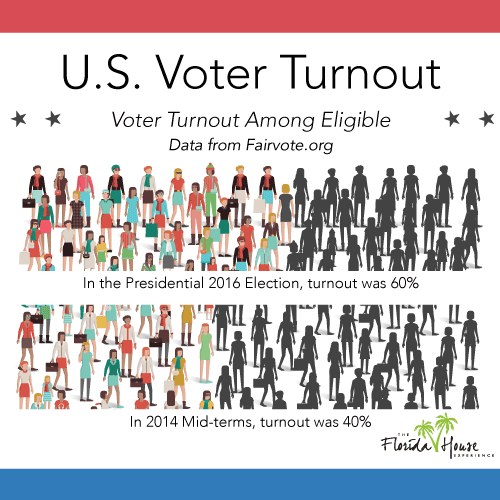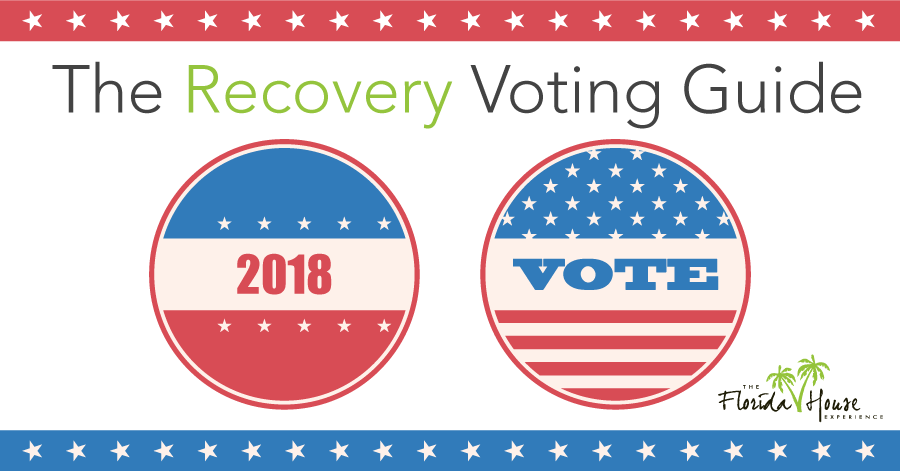
With the 2018 midterm elections just around the corner on November 6th, there’s a lot of buzz – and uncertainty – about how members of the recovery community will be impacted by the outcome of the vote.
Questions around which candidates are most likely to support positive measures for people dealing with addiction issues are complex, and so are the choices faced by voters. This election, many people in the recovery community are voting for politicians who support policies and laws that will help improve access to substance abuse treatment. They are also looking for leaders who want to reduce opioid-related deaths, promise to address sexual harassment, improve workers’ rights, and address the many other tough topics related to addiction, substance abuse, and recovery.
What’s At Stake?
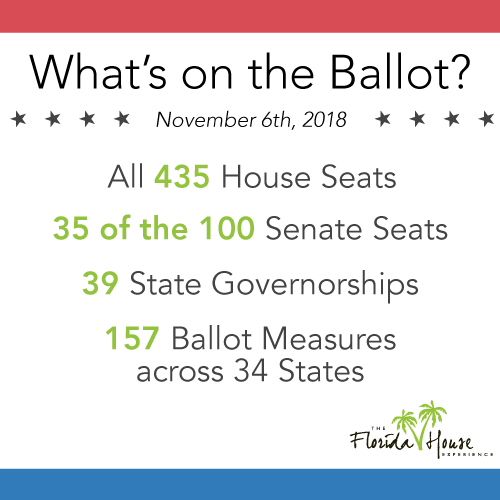
In Florida, voters will be asked to choose whether or not to restore the voting rights of the more than 1.6 million felons in the state; Arkansas and Missouri voters need to decide where they stand on a higher minimum wage; and voters throughout the country will be faced with tough questions related to the #metoo movement, health insurance, and the criminalization of addiction.
Opioid Use & The 2016 Election – What We Know Now
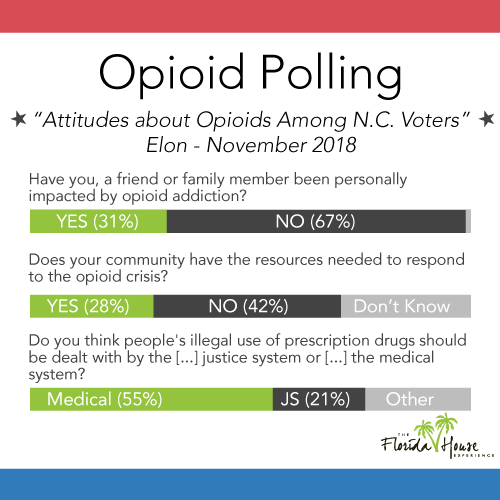
The study, published on June 22, 2018, in the Journal of the American Medical Foundation (JAMA) found that chronic use of prescription opioid drugs was correlated with support for the Republican candidate in the 2016 US presidential election. Chronic opioid use was defined by the number of prescriptions for opioids that extended for 90 days or longer during 2015 on a county-by-county basis. This leads to the authors to conclude that, “The association of the presidential vote with chronic opioid use underscores the importance of cultural, economic, and environmental factors associated with the opioid epidemic.”
Recovery and Addictions Issues Prominent This Election
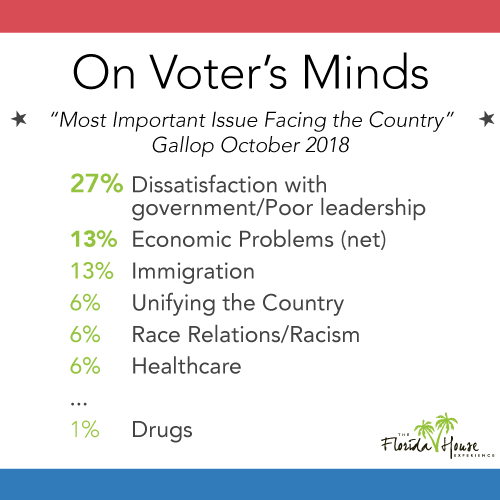
Some members of the recovery community support this hardline stance that is consistent with holding drug users accountable for their actions, while others see the increased criminalization of addictions as a regressive policy.
The opioid crisis continues to be a major talking point among candidates as well, and in 2017 the U.S. Department of Health and Human Services declared that the opioid crisis was a Public Health Emergency. The HHS also announced the launch of a 5-point plan to tackle opioid addiction and overdoses which included “$485 million in grants for their evidence-based prevention and treatment activities“. Still many believe that more can be done to address the epidemic. The actions taken thus far have largely been public awareness steps and guidance for other departments and industries.
Minimum Wage Increases On The Ballot in Arkansas & Missouri
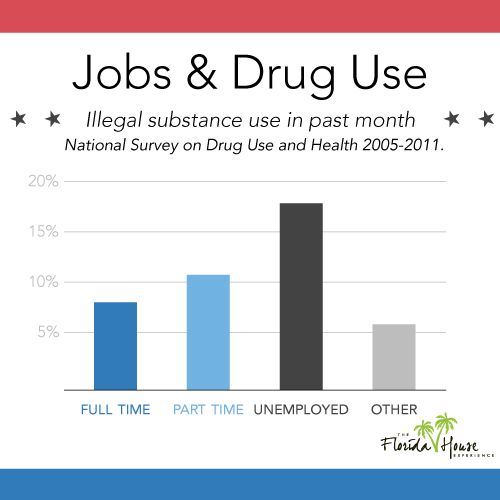
In Arkansas, voters are being asked to decide on Issue 5 – the Minimum Wage Increase Initiative which seeks to increase the minimum wage incrementally from the current $8.50/hr to $11/hr by 2021. In Missouri, Proposition B asks voters to decide whether or not the state minimum wage should jump from $7.85/hr to $12/hr by 2023, followed by annual increases linked to the Consumer Price Index.
Data compiled from multiple federal government sources and non-profit groups rank Missouri as being the second-worst state in the country when it comes to substance abuse and addiction, while Arkansas ranked 19th on the list.
Proponents of a higher living wage (often referred to as a ‘living wage’) point to statistics that show a strong link between low wages and drug abuse, low educational levels, and criminal activity.
A review of over 6 million prisoners who exited the federal prison system between 2004 and 2014 after serving sentences for nonviolent property and drug-related crimes found that state and federal minimum wage laws impacted recidivism rates. According to the researchers, “for each 8% increase in minimum wages, they found the rate of re-offending within the first year dropped by 2% – a pretty big reduction given the life-impacts and dollars at stake“.
On the other side of the argument are business owners who claim that increasing the minimum wage will ultimately cost jobs. Given that it’s common for people to take on part-time, low-skill jobs during their early stages of recovery, the loss of entry-level jobs could have a negative impact on people who are dealing with addictions.
Another study from the University of Washington demonstrated that when employers began paying new minimum wages of up to $13 an hour, they tended to cut hours. This is sometimes done to avoid covering health insurance for the employee or to cut costs. Opponents say this ultimately defeats the purpose of minimum wage laws.
Expect More Changes to the ACA
While the ballot doesn’t specifically cover addiction-related issues like the Affordable Care Act, funding for addiction and recovery services, and measures to tackle the ever-growing opioid crisis. Some politicians on the 2018 ballot are actively involved in a lawsuit that seeks to allow insurance companies to discriminate against those with pre-existing conditions. They argue that this will allow for cheaper health insurance plans. This could exclude millions of addicts from accessing insurance coverage for substance abuse treatment that they desperately need. Addiction and behavioral health treatment, much like cancer, is not something you plan on needing coverage for, until you do.
Sexual Harassment, Abuse, and Assault

Substance abuse disorder often times takes root after an initial sexual harassment or sexual assault incident. “Victims of sexual assault are three times more likely than the average person to suffer from depression, and six times more likely to suffer from Post-traumatic stress disorder.” Inversely, substance abuse may also lead to incidents of sexual assault, causing what can often be a lifetime of emotional trauma and further drug and alcohol abuse.
The correlation between these documented sexual assault instances and subsequent substance abuse disorders has fanned the flames of the #metoo movement. The effects of this movement are truly far-reaching. Interestingly, a record amount of women are running for political offices in 2018. A force to be reckoned with, these women are taking Washington by storm. “More than 20,000 women have inquired about running, this compared to just 900 over the 2015/2016 election season,” according to emilyslist.org, an organization that prepares interested candidates for political seats.
In 2018, 575 women are running for office (including the primaries), with 256 qualified candidates appearing on the final November ballot, according to Politico.com. The #metoo movement continues to grow and receive considerable attention. For women across the country, these issues truly matter and politicians will continue to elevate the damage inflicted by sexual assault to the public consciousness.
Right To Work
Membership in a labor union has historically included access to top-tier healthcare insurance. One benefit of this relationship is a broader range of options for members who need detox and treatment services. The impact that unions have had on this country is hard to measure, from the 5 day work week to safer and better-paying jobs. Yet, union membership has almost continuously dropped since the 50s. In part, this is due to corporations taking a hard-line against unions, and partly due to a campaign to paint them as an outdated and unnecessary bureaucracy.
The ‘right to work’ laws appearing across the country go a step further to hamstring their functionality. When a state becomes ‘right-to-work,’ it means that you do not have to pay union dues to become a union member and that the employer cannot force you to join the union. Union workers generally pay about two hours of work toward union dues each month; meanwhile, they are paid more than a non-union member, pay less per month and receive more from their benefits packages. When the state enforces laws to permit membership without union dues, the benefits of the union suffer as there is less capital in the union to negotiate. Furthermore, in states that have enacted RTW laws, membership has plummeted. Quality behavioral and mental health treatment often relies on quality health insurance, and unions have historically been able to provide that for their members.
Voter Turnout
